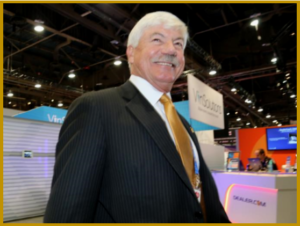 NADA* Chairman Jeff Carlson at the Automotive Press Association in Detroit today said politicians and regulators in Washington, D.C. are implementing regulations that would make buying, financing, trading-in and servicing vehicles harder and more expensive for consumers.
NADA* Chairman Jeff Carlson at the Automotive Press Association in Detroit today said politicians and regulators in Washington, D.C. are implementing regulations that would make buying, financing, trading-in and servicing vehicles harder and more expensive for consumers.
This, he maintains, actually works against legitimate public policy goals, many of which NADA supports. Carlson said that auto dealers are in favor of reducing greenhouse gas emissions, and attaining a 100% recall completion rate. However, decisions in Washington and elsewhere are leading to increased prices for consumers when buying new vehicles, financing those vehicles, and negatively affecting trade-in values of older vehicles for newer, cleaner and safer cars and trucks.
“If Washington wanted to implement a policy that would add $600 to the cost of financing a new car, what would you call that?” Carlson asked APA. “What about a policy that would take anywhere from $1,200 to $6,000 out of a customer’s pocket when they went to trade-in a used vehicle in order to buy a new one? How about a policy that would add thousands of dollars to every single new vehicle that every manufacturer makes, up and down their entire lineups, right out of the gate? Or what if new-car buyers had to pay hundreds of dollars more at the retail level because Washington thought it was no longer beneficial to consumers to have multiple, independent retailers competing with each other for the same customers?” (See NADA Chairman Defends Auto Retail Practices. Again)
Some of the regulations – The Consumer Protection Financial Bureau financing disclosure regulations comes to mind here – are proposed or being implemented because of abuses by auto dealers, of course. Only 36% of NADA dealer members have adopted NADA’s own credit compliance policies that could have headed off the regulations. As it stands now, there is a fierce lobbying battle in Washington to get the regulations rescinded.
As an aside, Carlson’s dealerships do follow the recommended NADA financial disclosure policies, so he walks the talk. (See NADA Opposes Credit Reform on Auto Lending Practices or CFPB Scoffs at NADA FOIA Request on Auto Lending or FTC Says Sage Auto Group Uses Deceptive Tactics or Predatory Credit Charges on Used Cars Filed by DOJ Financial Protection Bureau Auto Loan Regulation Anti-Consumer Says NADA)
Solutions to other problems require nuanced thinking and practical, non-traditional methods. These, in AutoInformed’s wearying experience, can be beyond the intellectual capabilities of lobbying or pressure groups, regulators and politicians. And – of course – some political groups are downright opposed to reform, no matter what their public posture is.
Take the recall rate completion rate problem. About 70% of recalls are completed nationally because R.L Polk can only supply new car registration data. After a couple of years, tracking ownership registration becomes murky. The obvious solution is to go to a national registration and driver’s licensing system. Good luck with that, as the states use their motor vehicle departments as a giant source of revenue with varying degrees of competence.
Carlson – who is also the affable, well-spoken, well-prepared president of Glenwood Springs Ford and Glenwood Springs Subaru in Colorado, as well as Summit Ford in Silverthorne, Colorado – is leading the efforts of franchised auto dealers to lobby leaders in Washington. NADA is telling them that their policy objectives can’t be achieved if vehicles become too expensive for consumers to afford. (NADA, American Truck Dealers Oppose Cleaner Trucks)
“Leaving aside what Washington calls it, what would that feel like as a customer?” Carlson said. “Do you think that customer feels like they just got taxed? You’re darn right they do.” No argument here, but sometimes taxes are necessary – non-taxpaying presidential candidate Donald Trump not withstanding. NADA was active at both political conventions, but has not endorsed a candidate.
“NADA is in the business of telling Washington that they better get it right. And getting it right means keeping it affordable,” Carlson said.
“So what NADA has said to leaders in Washington is that: We understand your goals, and we agree with many of your goals, but we cannot accomplish those goals on the backs of our customers. What we’re doing is standing up for our customers, and helping Washington find a better way that protects our customers but still gets us across the policy goal line,”Carlson said.
* National Automobiles Dealers Association

